Dentures—Dallas, TX
The Tried-and-True Tooth Replacement Treatment

Millions of Americans suffer from tooth loss, so you’re not alone if you find tasks like eating and speaking, which should be simple, difficult due to having gaps in your smile. Teeth are an important aspect of maintaining a good quality of life, which is why our dentist recommend that patients restore them with either full or partial dentures. Depending on how many teeth you’re missing and where they’re located, you may benefit from one of our many tooth replacement treatment options. To find out whether you’re a good candidate for full or partial dentures in Dallas, schedule a consultation today!
Why Choose Daily Smiles Dental Dallas for Dentures?
- Family-Friendly Dental Practice
- Multi-Decades of Experience
- We Offer Additional Financing
Who is a Good Candidate for Dentures?
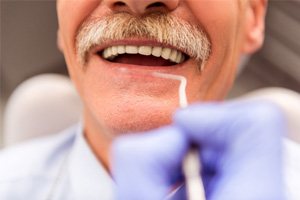
Dentures in Dallas are a tried-and-true tooth replacement solution that millions of people trust to restore the function and aesthetic of their smiles. Whether you’re missing several or all of your teeth across an arch, these prosthetics are custom-designed to comfortably and effectively replace them, allowing you to eat and speak with ease once again. If you’re wondering whether dentures are right for you, call our office today to schedule a consultation and find out!
Effects of Missing Teeth
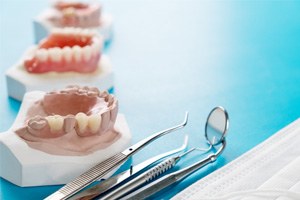
If you’re missing teeth, know that you’re not alone. In fact, the American College of Prosthodontists estimates that 40 million adults in America are missing all of their teeth. Where this can become an issue that leads to declining quality of life and oral health is if they never get replaced.
When teeth go missing, it leaves gaps throughout your mouth, creating hideaways for plaque and bacteria as well as functional problems, like difficulty chewing food. Over time, this can lead to an increased risk of dental problems like gum disease and decay as well as jawbone deterioration and facial changes because your teeth are no longer supporting and stimulating your facial anatomy. This is why many people turn to dentures, because they’ve been used for centuries to help patients regain their confidence and abilities to complete basic tasks like eating and speaking.
What Qualifies You for Dentures?
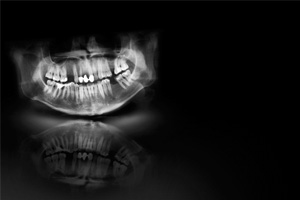
Patients who qualify for dentures are those who have suffered from extensive tooth loss, which means they’re missing anywhere from several to all of their teeth throughout an arch. We offer different types of dentures, which you can read more about on this page, to fit a variety of needs, including partial, full, and implant dentures. However, the only way to learn whether you’re a good candidate is to have your mouth professionally evaluated by our dentist at Daily Smiles Dental Dallas.
Alternative Options for Tooth Replacement
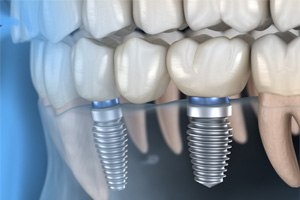
If traditional dentures don’t seem like the perfect fit for your tooth loss needs, we also offer dental bridges and implants, which can rebuild and replenish your smile.
- Dental bridges are comprised of two dental crowns fused to either side of one or more free-standing replacement teeth, called pontics. The crowns are anchored to your existing teeth to fill a gap in your smile left by one or more consecutive missing teeth.
- Dental Implants are very flexible and provide patients with a more permanent alternative to traditional restorations, like dentures. These use biocompatible screw-like implants to replace the missing root structure of teeth, providing free-standing prosthetics like dentures, bridges, and crowns with a stable foundation to be attached to. modern treatment This comes with a spectrum of unique benefits that makes it a popular choice among patients.
Types of Dentures

The type of dentures that you need to complete your smile will depend on a couple of factors that we’ll discuss with you during your consultation, including the position of your missing teeth within your mouth and the number of teeth you’re missing. Based on our findings, we may recommend any of the following denture solutions.
Partial Dentures

We often recommend partial dentures for patients who are missing several teeth in an arch. This problem can make it incredibly difficult to chew food and increase your risk of developing oral health problems down the road if it isn’t addressed. Without replacing these teeth, it can cause your existing surrounding ones to slowly drift out of place in an effort to fill the gaps in your smile. Partial dentures are strategically designed to discreetly fill these spaces with artificial, natural-looking replacement teeth. They use a customized metal or acrylic base to stay secured in place and can be easily removed to clean.
Full Dentures

For patients who are missing an entire arch or all of their teeth, your dentist in Dallas will likely recommend full dentures. These are an entire row of artificial teeth crafted from natural-looking materials, such as ceramic, that are attached to a gum-colored acrylic base. The structure of full dentures are customized to comfortably fit your mouth with the use of natural suction and dental adhesive for a strong and stable bite.
Implant Dentures

Patients who are looking for a more permanent, stronger solution to replacing missing teeth may benefit the most from implant dentures in Dallas. These are lifelike prosthetics that are anchored to small titanium posts that are surgically placed beneath the gums and fused with the jawbone. Because this treatment restores the entire structure of missing teeth, patients are able to enjoy a variety of unique benefits with implant dentures compared to traditional prosthetics.
How Dentures are Made

It makes sense that you would want to learn more about the process of crafting dentures since this treatment is a big investment in your health and wellbeing! Our team partners with the best laboratories in our area to ensure you receive a prosthetic that not only looks natural in your mouth, but that’s also fully functional. Click below to learn more about how your restoration will be crafted.
What are Dentures Made Of?

There are multiple aspects of dentures, including the base and replacement teeth, that are each made from different materials. Not to mention, you will be able to choose what types of materials you want your dentures made based on your budget and aesthetic goals.
- The Base of Your Dentures: The base of your dentures is custom-fitted to secure atop your gumline and jawbone, using natural suction to remain in place. Typically, the base of dentures is made from materials like acrylic, nylon, or resin, and are custom-shaded to match the color of your gum tissue. If you’re receiving partial dentures, you may have a metal clip that’s hidden by a discreet acrylic or nylon base.
- The Replacement Teeth: The artificial teeth will be attached to the base of the dentures and shaded to look like natural tooth enamel. Typically, these are made from resin or porcelain due to how closely they resemble home-grown teeth. Not only are these materials life-like in appearance, but they’re also incredibly durable, allowing them to withstand daily use.
The Denture Creation Process

- First, your dentist will capture an impression of your jaw and mouth, creating a model that they can then send off to the dental laboratory for the technicians to design your dentures after.
- A wax model will then be carved based off the impression, ensuring that each ridge, divot, and crease is as close to identical as possible.
- Once the model of your mouth is carved, plaster will be poured into it to hold its shape and the wax will be melted away with hot water.
- Holes are then made in the teeth and base areas, allowing them to be filled with materials like acrylic and nylon.
- The plaster is removed using a special tool and the dentures are placed in an ultrasonic bath to remove any materials. Excess dental materials will then be cleared away and the final restoration will be polished and sent back to our office for you to try on!
Adjusting to Your New Dentures

Your dentures in Dallas will likely feel strange at first, especially if you have been living with gaps in your smile for a long time. The typical adjustment period for patients is about 30 days. In this time, you will strengthen the muscles around your cheeks and jaw to help hold your dentures in place and allow you to eat and speak more effectively. Just remember to be patient and give yourself enough time to properly adjust!
The Benefits of Dentures

Whether you opt for full, partial, or implant dentures, replacing your missing teeth offers life-changing benefits that can impact your quality of life. Not only will you be able to smile with confidence again, but basic daily tasks like eating and speaking will be much easier with a complete and functional set of pearly whites.
Psychological Benefits

If you’ve been missing teeth for a while, you may have noticed your self-esteem gradually decline as your social life and health have become affected by the gaps in your smile. By increasing your chances of experiencing depression and anxiety, living with several or an entire row of missing teeth can deeply affect your psychological health. With dentures, you may notice that you’re more open to entering social settings and feel overall better about letting your grin show.
Clearer Enunciation

Missing teeth can make it more difficult to pronounce certain words, causing you to develop a lisp and other speech impediments. Although you’ll go through a short adjustment period with dentures to get used to talking with them, they can improve your speaking abilities and help you feel more comfortable and confident while talking.
Better-Balanced Diet

Missing several or all of your teeth can impact your ability to chew certain foods, drastically limiting your diet to contain mostly softer foods. This can impact your physical health and cause you to consume less meat and chewier foods that are crucial additions to your diet. With a complete set of teeth, you can chew more easily, expanding the foods you’re able to eat and allowing your body to better absorb the nutrients from your meals. Implant dentures are even able to restore your natural bite power by up to 80%!
Improved Oral Health

Missing teeth can lead to an increased chance of a variety of oral health problems, including:
- Bone resorption
- Orthodontic problems
- Gum disease
- Cavities in existing teeth
With full and partial dentures, you can easily get in the habit of cleaning your gums and existing teeth and block off any gaps within your mouth for bacteria and plaque to hide.
Expanded Life Opportunities

Your smile is often the first trait that people notice about you, so when you feel self-conscious about yours, it may cause you to hide it behind your lips or hands, causing others to immediately pick up on your self-consciousness. During job interviews, first dates, and social gatherings, this lack of confidence can lead to a bad first impression, affecting your ability to secure a new career or go out on a second date with someone you genuinely like. With a complete set of pearly whites, you can smile with pride again and get the most out of all of the opportunities that come your way.
Understanding the Cost of Dentures
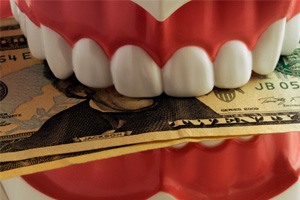
Factors That Affect the Cost of Dentures

There are four main factors that determines the cost of dentures in Dallas, including:
- Preliminary Treatment: Before getting dentures, you may require preparatory treatments like tooth extractions or gum disease therapy. These will incur costs separate from your denture treatment.
- How Many Teeth Need to Be Replaced: We offer both full and partial dentures. Because full dentures restore an entire arch of teeth and require more materials and crafting than partials, they typically have a higher price.
- Insurance Coverage: While many dental insurance plans cover at least a portion of the cost of dentures, including Medicaid, you may be required to pay out-of-pocket depending on your specific plan.
- Materials: The materials you choose to have your dentures crafted from can also play a role in their overall cost.
Are Implant Dentures More Expensive?
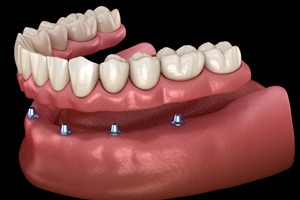
While implant dentures have a higher up-front cost, they’re recognized to be a better long-term investment due to their extensive lifespan and unique benefits that distinguish them from traditional dentures. With the ability to last for over 35 years, implant dentures require fewer repairs and replacements and visits to your dentist, so while their cost may be higher, they could help you save down the road. Not to mention, you’ll be able to enjoy a variety of life-improving benefits, like the restoration of up to 80% of your bite power.
Does Dental Insurance Cover Dentures?

Most dental insurance plans and Medicaid cover at least a portion of the cost of dentures. Our team at Daily Smiles Dental Dallas accepts virtually all PPO dental insurance plans as well as Medicaid, allowing you to get the most out of your coverage, all while minimizing any out-of-pocket costs.
Other Options for Making Dentures Affordable

In addition to accepting Medicaid and dental insurance, we also offer additional financing through CareCredit. Upon approval, CareCredit can split the cost of your treatment up into more manageable payments at little-to-no interest, allowing you to easily fit your treatment into your monthly budget.
Tips for Maintaining Your Dentures

After getting your new dentures in Dallas, you’ll want to maintain them as best as possible to maximize their lifespan. This includes cleaning them daily, getting them relined and adjusted whenever necessary, taking them out before going to sleep, and more. If you have any questions about maintaining your new prosthetic, don’t hesitate to contact our team at Daily Smiles Dental Dallas Dallas for guidance.
Removable Denture Maintenance
Take Them Out After Eating
When you eat, food debris can combine with saliva to create a sticky, bacteria-riddled film that can coat your dentures and become wedged between your prosthetic and gums. This is why rinsing them after meals is so important.
To clean your dentures, you can use room temperature water. Avoid hot water, as this can cause your new restoration to warp and change shape, affecting your ability to comfortably wear it.
Regularly Clean Them
In addition to post-meal rinses, you should clean your dentures more thoroughly once or twice a day to prevent bacteria from accumulating within your mouth, leading to issues like thrush and gum disease.
The best way to clean your prosthetic is by using a soft-bristled or special denture-cleaning toothbrush. You can use denture cleanser or clear hand soap, but be sure to avoid toothpaste, as it’s more abrasive and can scratch them. Before putting them back in your mouth, thoroughly rinse off any lingering soap from the dentures and dry them.
Store Them in a Safe Space
If you have children, pets, or anybody in your home that could gain access to your dentures, be mindful of where you set them down. We recommend always storing them in a high place. For removable full dentures, you’ll want to store them in a room temperature glass of water. If you have partial dentures, we recommend securing them in their hard storage case. This will prevent any accidents from happening that leave your restoration non-functional and damaged!
Remove Them Before Sleeping
Before you go to bed, it’s crucial for you to remove your dentures and store them in a glass of room temperature water or denture soaking solution. This will help them keep their shape as well as give your gums a much-needed rest. As you’re wearing your prosthetic throughout the day, it can restrict your oral circulation, and if you don’t take them out at night, it could lead to irritation, oral sores, and infection.
Notice Changes in Their Fit
The average lifespan of dentures is between seven and 10 years. As you approach this time, be sure to keep an eye out for any changes in their fit. If they begin rubbing your gums uncomfortably, continuously slip out of your mouth or dislodge from your gumline, or cause problems like oral thrush, bring them into our office so we can examine them. In some cases, a simple relining can help improve their function. However, if they are damaged or ill-fitting beyond repair, we may recommend having them replaced.
